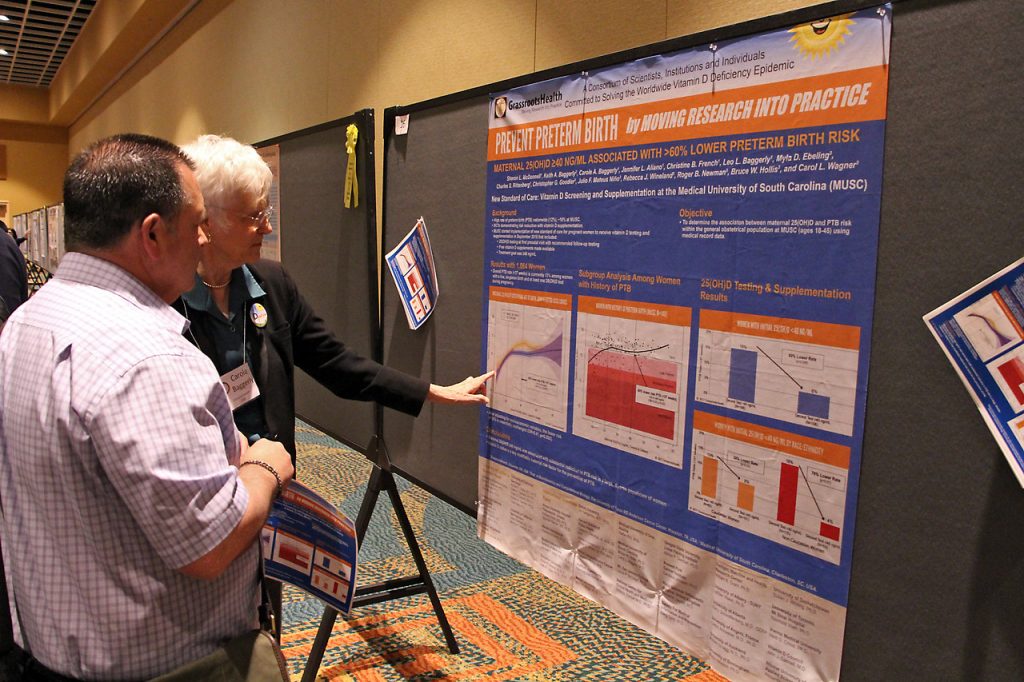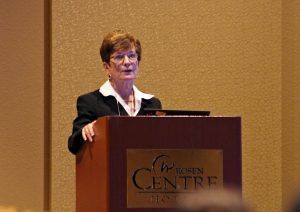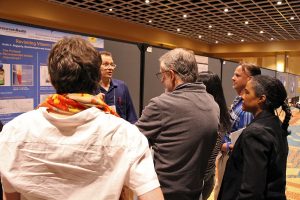Published on December 12, 2017

Carole presents pregnancy data to attendees
The Vitamin D Workshop is a yearly conference dedicated to sharing research on vitamin D. This March they met in Orlando, Florida for the 20th workshop! 219 researchers, clinicians, and nutrition experts mingled for 4 days participating in 14 presentation sessions, 174 poster presentations, and ample time for discussion.
After each conference the proceedings are published in a special issue of the Journal of Steroid Biochemistry and Molecular Biology and authors of both oral and poster presentations are encouraged to submit papers. The conference executive committee also produces a summary paper. This summary, Highlights from the 20th Workshop on Vitamin D in Orlando, Mar. 28-31, 2017, was published on November 24, 2017. There is no free summary available on the web, but it is available for purchase.
GrassrootsHealth Participation
GrassrootsHealth sent three representatives and saw many of their 48-strong International Scientists Panel. GrassrootsHealth presented two posters during the conference on our own and three more in conjunction with outside researchers. Following is information about the research presented:
- Preliminary results from a vitamin D screening and supplementation field trial of pregnant women – We presented data from the Medical University of South Carolina field trial. Later in 2017 a full paper detailing the results of the field trial was published. Blog about this published research here.
- Moving vitamin D research into practice through nutrient field trials – This poster profiled the methodology of doing nutrient field trials with large groups, including D*action, which is over 10,000 participants strong. One step in the methodology is to publish results, which we have done with many research papers on the association of higher vitamin D levels with lower risk of common conditions. Find many of the papers here.

Keith Baggerly presents data on RDA
Revisiting Vitamin D Recommendations – created and presented with the help of Dr. Keith Baggerly, PhD, MD Anderson Cancer Center. This poster outlined the statistical mistakes the IOM used in calculating the 2010 RDA for vitamin D and calls for a re-analysis of that RDA. An oral presentation of that material was given at another conference and can be viewed here.
- Implementation of a vitamin D screening pregnancy program at a southeastern urban medical center to address health disparities – created and presented in partnership with Dr. Carol Wagner and the Medical University of South Carolina. Blog about implementation here.
- High mean serum 25-hydroxyvitamin D concentration (>= 49 ng/ml) of San Diego CA lifeguards – Joint work of Dr. Cedric Garland and GrassrootsHealth. Chart of data at end of this blog.
Session Content
There were 14 sessions during the conference.
Year in Vitamin D: Basic and Translational – Dr. James Fleet (Purdue University, IN) – An overview of some of the key research in the vitamin D field in 2016-2017.
Vitamin D, Immunity and the Microbiome –Microbiomes, how vitamin D receptors (VDRs) are linked to mirobiota, inflammation and mouse trials to reduce inflammation.
Vitamin D and Suppression of Malignancy – How VDRs regulate cells of liver fibrosis and liver cancer, vitamin D and lung cancer, vitamin D and bladder cancer, vitamin D and all-cause mortality.
Structure/Function and Vitamin D Analogs – Dr. James Gleason (McGill University, Montreal, QC) gave a presentation of his research on cancer and vitamin D analogs (look-a-like, man-made agents similar to 1,25-dihydroxyvitamin D3).
Vitamin D, UV Light and Skin Biology –UV and the skin, its downstream effects on the body, DNA repair, healing wounds, and how evolution created lighter skin and its effects on vitamin D synthesis today.
Vitamin D Metabolism – Research presentations on gene-mutations that could slow vitamin D synthesis in people, and in population groups. All of these talks focused on specific genes, but many included some part of the CYP gene family.
Transcriptional Regulation by VDR – How genes can affect VDRs, both in humans and mice models.
Vitamin D and Healthy Aging – Five researchers spoke on vitamin D research with Alzheimer’s, Hutchinson Gilford Syndrome, lowering plasma glucose, and overall risk of disease with age.
Joint Plenary of the Vitamin D Workshop and the International Aldosterone Conference – Dr. Victor Corces (Emory Univeristy, Atlanta, GA) presented on genome structure and regulation.
The Big Debate
One of the most hotly awaited topics was a debate on the topic “RCTs are the only appropriate way to demonstrate the role of vitamin D in human health.” This topic is very near and dear to our hearts at GrassrootsHealth, as we feel the evidence is out – it is time to move the research of vitamin D into practice. And if you are reading this, you probably do too! It is highly likely you are part of our D*action project, which is a field observation trial, not an RCT. This means that your participation is not blind, you know if you are taking vitamin D to increase your level and there is no control group, we don’t send anyone fake vitamin D. Instead we have over 10,000 participants who test their vitamin D levels and report on their health status and we often compare those reports with the ‘norm’ of the day, as reported by government entities or charities such as NHANES, the National Cancer Institute, or the March of Dimes.
In the end, the debate was inconclusive. Dr. Rolf Jorde (Romso, Norway) presented the case for the positive side (for RCTs) and Dr. Robert Scragg (Auckland, New Zealand) presented the case for limitations of RCTs and the need for inclusion of other study types.
Vitamin D and Breast Cancer contained three different talks. The first gave an overview on the field and the fact that there is a high incidence of vitamin D deficiency in breast cancer patients. The other two talks were on VDRs in breast cells, which is an effort to determine how vitamin D can help prevent and regulate breast cancer if we can identify the mechanism.
Vitamin D Biology in Non-traditional Models – a discussion of vitamin D’s effects on both eggshells and worms.

Dr. Joan Lappe presents her cancer trial
Clinical Trials – reviews of recent clinical trials was done by four different researchers. The researcher who reviewed trials on falls and fractures made a point of explaining that negative results could have been due to the bolus dosing that was used in those trials. Dr. Joan Lappe presented findings of her cancer trial, a description of this trial is available here and a featured chart is here. Results from a trial with data from Danish children aged 4-8 years old were also presented. It found that Danish children needed 780 IU vitamin D/day to remain above 20 ng/ml (50 nmol/L) during the winter and that this was more than the 600 IU/day recommended by the US IOM. Read paper here.
Vitamin D, Inflammation, and Diabetes – four different talks about the effects of vitamin D on cholesterol metabolism, insulin resistance, inflammation and the respiratory system. Since the conference Martin Hewison et al. has published their paper on vitamin D and Rheumatoid arthritis, news article here. Dr. Amy Riek et al. has also published her paper vitamin D and type 2 diabetes, read paper here.
Resources
Highlights from the 20th Workshop on Vitamin D in Orlando, Mar. 28-31, 2017
Journal of Steroid Biochemistry and Molecular Biology
Martin Hewison et al.
November 2017
Read Paper

